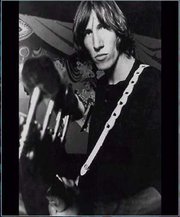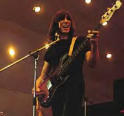Roger Waters
|
|
Waters1.jpg
George Roger Waters (born September 6, 1943 in Great Bookham, Surrey near Dorking) is a British rock and roll musician and songwriter.
He is best known for his 1965-1985 career in the band Pink Floyd as singer-songwriter and bass player. He then led a moderately successful solo career.
| Contents |
|
|
History
(1965-1985) Band years
In 1965, Roger Waters was a founding member of Pink Floyd (under the moniker Architectural Abdabs, later changed) with then lead singer, guitarist, and principal songwriter Syd Barrett – as well as Richard Wright and Nick Mason.
In 1968, when Syd Barrett's deteriorating mental health led to his departure from the band, Waters set the band's artistic direction, along with co-writer, guitarist, and singer David Gilmour, who had joined the band to replace Barrett. Together, they brought Pink Floyd into the limelight, producing a series of albums that remain among the most critically acclaimed and best-selling records of all time.
Through the late 1970s, however, Waters' relationship with Gilmour grew strained, as Waters exerted more and more creative control over the band, on Animals, and The Wall. In 1983, the last Waters-Gilmour collaboration, The Final Cut, was credited as being a Roger Waters album performed by Pink Floyd.
In 1985, Waters proclaimed the band dissolved. The ensuing disagreement between Waters and Gilmour over the latter's intention to continue to use the name "Pink Floyd" progressed into a lawsuit. Waters claimed that as the original band Pink Floyd consisted of himself, Syd Barrett, Nick Mason and Richard Wright, that the band could not reasonably call itself by the same name now that it was without three of its founding members (Wright was kicked out of the band by Waters during the recording of The Wall). Another of Waters' arguments was that he had written almost all of Pink Floyd's lyrics, post Barrett. However, Gilmour won the right to use the name "Pink Floyd" and a majority of the band's songs, though Waters did retain the rights to the album The Wall and all of its songs.
(1985- . . . .) Solo years
Roger_Waters_Amused_to_Death.jpg
Amused to Death album cover
Waters embarked on a solo career after Pink Floyd, producing three concept albums and a movie soundtrack that failed to garner impressive sales. After Amused to Death in 1992, Waters spent much of the 1990s composing an opera entitled Ça Ira. It was announced to be finished on Roger Waters' website in February of 2005.
After the Berlin Wall came down in 1989, Waters staged a gigantic charity concert of The Wall in Berlin on July 21, 1990 to commemorate the end of the division between East and West Germany. The concert took place on Potsdamer Platz, a location which was part of the former "no-man's land" of the Berlin Wall, and featured many guest superstars and at the time was the biggest concert ever staged.
After a long hiatus, he started touring again in the late 1990s, performing live concerts of some of his most well-known work with Pink Floyd, alongside material from his solo career, before sizable audiences. He is also known to spend time working on a new solo album, which has the working title of Heartland, and will be released in 2006. Two possible tracks from this forthcoming album have been released on In the Flesh Live and the compilation Flickering Flame: The Solo Years Vol. 1 respectively.
In 2002 Waters performed at a concert organized by the Countryside Alliance in support of fox hunting, although Waters has never publicly held the Tory allegiances that this might suggest, and in fact viciously criticized the Thatcher government's policy in the Falklands War on The Final Cut (especially on the track "Get Your Filthy Hands Off My Desert").
Waters' father, Eric Fletcher Waters, a soldier in the British Royal Fusiliers, lost his life in the Anzio Campaign of World War II (which is described in Waters' song "When the Tigers Broke Free"). This loss has been a recurring theme in much of Waters' work.
Miramax Films announced in mid-2004 that a production of The Wall is to appear on Broadway, with Waters playing a prominent part in the production of it. Reports say the musical will contain not only the original tracks from The Wall, but also songs from Dark Side of the Moon, Wish You Were Here and other Pink Floyd albums, as well as new material.
In September 2004, Waters released two new tracks "To Kill The Child" and "Leaving Beirut". These were released only on the Internet. Both of these tracks were inspired by the US/UK invasion of Iraq in 2003. Typically, his message was clear in the lyrics in lines such as: "Oh George! Oh George! That Texas education must have fucked you up when you were very small" (Leaving Beirut), thus ensuring that there will be no mis-interpretation. Roger appears in List of pacifists. After the tsunami disaster that occurred in late December 2004, Waters performed ("Wish You Were Here") with Eric Clapton at the NBC benefit concert. On June 12th 2005 it was announced Waters will reunite with Pink Floyd for a performance at the Live 8 concert in London.
Discography
Band discography
→ See the Pink Floyd discography between 1967 and 1985
Solo discography
RogerWaters-album-radiokaos.jpg
Amused to Death album cover
Studio albums
- (1984) The Pros and Cons of Hitch Hiking - concept album
- (1987) Radio K.A.O.S. - concept album
- (1992) Amused to Death - concept album
Soundtracks
- (1970) Music from "The Body" - movie soundtrack with Ron Geesin
- (1986) When the Wind Blows - movie soundtrack with others
Live albums
- (1990) The Wall Live in Berlin - live
- (2000) In the Flesh Live - live
Compilations
- (2003) Flickering Flame: The Solo Years Vol. 1 - compilation
External links
- Roger-Waters.net (http://www.roger-waters.net/) - The official Roger Waters website
- Roger Waters Online.com (http://www.rogerwatersonline.com/) - Large Roger Waters website and community
- Unofficial replacement for the official Roger Waters BBS (http://rwbbs.arrrg.org/)
- Amused To Death (http://www.ingsoc.com/waters/) - A Roger Waters fansite
Template:Pink Floydde:Roger Waters
he:רוג'ר ווטרס
nl:Roger Waters
pl:Roger Waters
pt:Roger Waters
fr:Roger Waters


